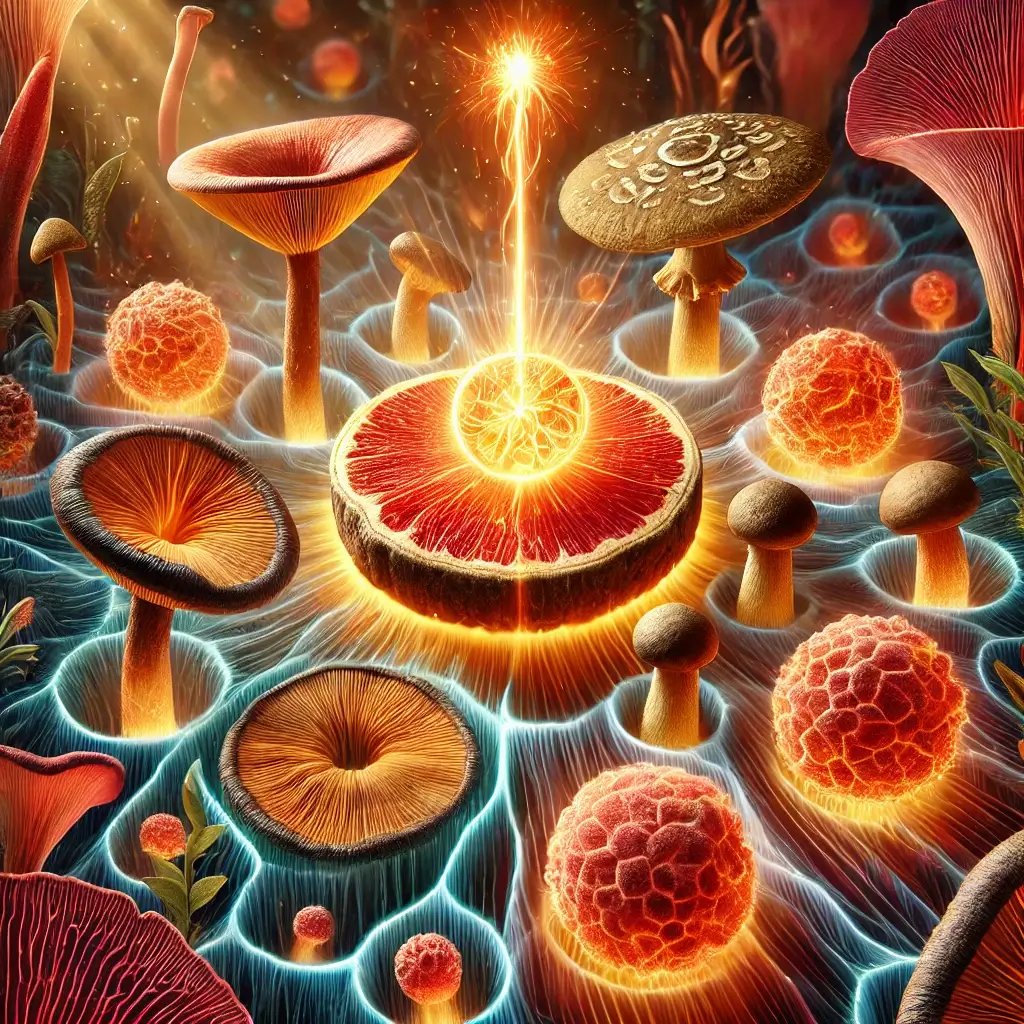Fighting Chronic Inflammation: How Reishi, Chaga, and Other Medicinal Mushrooms Support Long-Term Health
The Relationship Between Inflammation and Health
Prolonged activation of the immune system causes chronic inflammation, which in turn can cause the onset of chronic illnesses. The body uses inflammation as a defensive mechanism to combat infections and damage.
The Harmful Effects of Chronic Inflammation
Chronic inflammation, on the other hand, can harm normally functioning tissues and organs, paving the way for a host of serious illnesses like cancer, diabetes, arthritis, and cardiovascular disease.
Blood Vessel Damage from Inflammation
Damage to the body’s blood vessels is one way chronic inflammation contributes to chronic illnesses. Atherosclerosis, in which the arteries are blocked by plaque, can develop when the blood vessels become irritated due to chronic inflammation. Heart disease and stroke risks may rise as a result of this.
Inflammation and Insulin Resistance
Insulin resistance, a disorder in which cells in the body become less responsive to insulin, can also develop as a result of chronic inflammation. As a result, type 2 diabetes and hyperglycemia may set in.
Pancreatic Damage from Inflammation
The pancreatic cells responsible for insulin production can be damaged by inflammation, which in turn accelerates the onset of type 2 diabetes.
The Role of Inflammation in Cancer
Chronic inflammation, along with numerous other diseases, can play a role in cancer progression. Damage to DNA and mutations caused by chronic inflammation can result in the formation of cancer cells. By fostering an environment that is favorable to the development of cancer cells, inflammation can potentially accelerate their proliferation and metastasis.
Understanding Chronic Inflammation for Health
All things considered, chronic inflammation is one of the main causes of long-term health problems. Our ability to prevent and cure diseases caused by chronic inflammation depends on our ability to comprehend the processes by which this condition develops.
Lifestyle Modifications to Manage Inflammation
Chronic inflammation is a risk factor for many illnesses, although it may be mitigated via dietary and activity modifications, as well as anti-inflammatory drugs.
Medicinal Mushrooms and Inflammation Response
When it comes to inflammation, medicinal mushrooms can help promote a healthy response. The intricate biological process of inflammation is vital in warding off pathogens and injuries. On the other hand, many chronic disorders, including cancer, cardiovascular disease, and Alzheimer’s disease, can develop from chronic inflammation.
Anti-inflammatory Compounds in Medicinal Mushrooms
There are a number of chemicals found in medicinal mushrooms that have anti-inflammatory and pro-inflammatory properties. Some of these chemicals are:
Beta-glucans for Inflammation Control
Carbohydrates known as beta-glucans have anti-inflammatory properties because they block the synthesis of inflammatory cytokines.
The Role of Polysaccharides
Another kind of carbohydrate that has been demonstrated to decrease inflammation is polysaccharides. These activate macrophages, which are cells that ingest and kill foreign invaders.
Triterpenes and Their Benefits
One class of plant compounds with anti-inflammatory and antiviral effects are triterpenes.
Lion’s Mane and Hericenones
The lion’s mane mushroom contains a class of compounds called hericenones, which have anti-inflammatory and neurogenesis-promoting properties.
Popular Medicinal Mushrooms for Inflammation
Here are a some of the most well-known medicinal mushrooms used to treat inflammation:
Reishi Mushrooms and Adaptogenic Properties
One type of mushroom that can help the body deal with stress is the reishi mushroom, which is famous for its adaptogenic qualities. It has been demonstrated that reishi mushrooms can decrease inflammation and enhance immunological function as well.
Chaga Mushrooms and Antioxidants
The high levels of antioxidants found in chaga mushrooms are well-known. Additionally, chaga mushrooms contain anti-inflammatory and heart-healthy properties.
Lion’s Mane Mushrooms for Cognitive Function
Lion’s mane mushrooms: These mushrooms have a stellar reputation for enhancing memory and cognitive function. In addition to its anti-inflammatory and neurogenesis-promoting properties, lion’s mane mushrooms have other useful medical uses.
The Benefits of Shiitake Mushrooms
Shiitake mushroom: The umami and earthy flavor of shiitake mushrooms are well-known. Additionally, shiitake mushrooms contain anti-inflammatory and immune-enhancing properties.
Various Forms of Medicinal Mushroom Consumption
There are many different forms that medicinal mushrooms can be taken, such as extracts, powders, teas, and capsules. Food and drinks can also benefit from their addition.
Medical Advice Before Using Medicinal Mushrooms
Consulting a medical professional is essential before attempting to reduce inflammation using medicinal mushrooms. Before using medicinal mushrooms, it is crucial to weigh the advantages against the dangers, as they may interfere with several drugs.
Understanding Limitations of Mushroom Treatments
Furthermore, you should know that medicinal mushrooms will not alleviate inflammation. It is important to consult a medical professional in order to ascertain the root cause of inflammation and obtain suitable therapy.
References
- Elsayed, E.A., El Enshasy, H., Wadaan, M.A.M., Aziz, R. (2014). Mushrooms: A potential natural source of anti-inflammatory compounds for medical applications. Mediators of Inflammation, 2014, 805841.
- Guggenheim, A.G., Wright, K.M., Zwickey, H.L. (2014). Immune modulation from five major mushrooms: Application to integrative oncology. Integrative Medicine, 13(1), 32-44.
- Wasser, S.P. (2017). Medicinal mushrooms in human clinical studies. Part I. Anticancer, oncoimmunological, and immunomodulatory activities: A review. International Journal of Medicinal Mushrooms, 19(4), 279-317.
- Jayachandran, M., Xiao, J., Xu, B. (2017). A critical review on health promoting benefits of edible mushrooms through gut microbiota. International Journal of Molecular Sciences, 18(9), 1934.
- Friedman, M. (2016). Mushroom polysaccharides: Chemistry and antiobesity, antidiabetes, anticancer, and antibiotic properties in cells, rodents, and humans. Foods, 5(4), 80.













